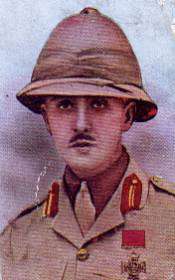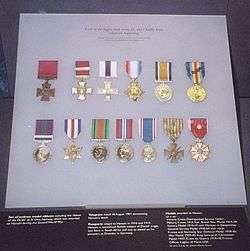Percy Hansen
| Percy Howard Hansen | |
|---|---|
 | |
| Born |
26 October 1890 Durban, South Africa |
| Died |
12 February 1951 (aged 60) Copenhagen, Denmark |
| Place of burial | Garrison Cemetery, Copenhagen |
| Allegiance |
|
| Service/branch |
|
| Years of service | 1911 - 1946 |
| Rank | Brigadier |
| Unit | The Lincolnshire Regiment |
| Battles/wars |
First World War Second World War |
| Awards |
Victoria Cross Distinguished Service Order Military Cross Order of St. Olav French Croix de guerre US Legion of Merit |
Brigadier Percy Howard Hansen VC, DSO, MC (26 October 1890 – 12 February 1951), was a British Army officer and recipient of the Victoria Cross, the highest and most prestigious award for gallantry in the face of the enemy that can be awarded to personnel of the British and Commonwealth forces.
There is disagreement concerning the places of Hansen's birth and death. Some sources state that he was born in Durban, South Africa; another says "Dresden, Germany (where his parents were taking a cure)".[1] Similarly, one source gives his place of death as "Kensington, London" and subsequent burial at Garnisons Cemetery, Copenhagen,[1] while another says he died in Copenhaven.
Early life
Hansen was born into a wealthy and well-connected Danish family that settled first in South Africa then, after 1900, in London.[1] He was educated at preparatory schools in Hazelwood, Limpsfield, Surrey and Oxted, Surrey; then at Eton College (from 20 September 1904).[1] His father, Viggo Julius Hansen, was naturalised as a British citizen in 1910[1] so that his son could join the British Army.
Military career
After officer training at the Royal Military College, Sandhurst, Hansen was commissioned into the Lincolnshire Regiment on 4 March 1911.[2]
He was appointed as a temporary captain shortly after the outbreak of war in 1914, as Adjutant in the regiment's 6th Battalion, and his promotion was made permanent in the following April. He fought with his regiment during the Gallipoli Campaign in summer 1915. On 9 August 1915 at Yilghin Bumu, Hansen's battalion was forced to withdraw while assaulting Scimitar Hill. Hansen and volunteers repeatedly moved back and forth under heavy fire to successfully rescue six wounded men from capture, or death by burning. Hansen was consequently awarded the Victoria Cross.
A month later, he won the Military Cross for performing a reconnaissance mission at Suvla Bay.[3] On the night of 9 September 1915, he carried out a solo reconnaissance of the coast, carrying only a revolver and a blanket for disguise. He successfully located an important Turkish firing position.
Due to ill-health, Hansen was eventually transferred to France and appointed brigade major to the 170th (2/1st North Lancashire) Brigade. He remained a staff officer for the rest of the war, during which he served with the II ANZAC Corps. He was made a Companion of the Distinguished Service Order for another daring reconnaissance mission during the Battle of Passchendaele in 1917.
Hansen attended the Staff College, Camberley after the war.[1]
Hansen served in Second World War, later achieving the rank of Brigadier. He is one of only fourteen men not born as either a British or Commonwealth citizen to have received the Victoria Cross.
Awards and decorations

- Victoria Cross (1 October 1915) "For most conspicuous bravery on 9th August, 1915, at Yilghin Burnu, Gallipoli Peninsula. After the second capture of the "Green Knoll" his Battalion was forced to retire, leaving some wounded behind, owing to the intense heat from the scrub which had been set on fire. When the retirement was effected Captain Hansen, with three or four volunteers, on his own initiative, dashed forward several times some 300 to 400 yards over open ground into the scrub under a terrific fire, and succeeded in rescuing from inevitable death by burning, no less than six wounded men."[1][4]
- Distinguished Service Order (16 September 1918) "For conspicuous gallantry and devotion to duty. He volunteered to carry out a reconnaissance, and brought back valuable information obtained under heavy artillery and machine-gun fire, which had been unprocurable from other sources. Throughout he did fine work."[1]
- Military Cross (29 October 1915) "For conspicuous gallantry at Suvla Bay on 9th September, 1915. He made a reconnaissance of the coast, stripping himself and carrying only a revolver and a blanket for disguise. He swam and scrambled over rocks, which severely cut and bruised him, and obtained some valuable information and located a gun which was causing much damage. The undertaking was hazardous. On one occasion he met a patrol of 12 Turks who did not see him, and later a single Turk whom he lulled. He returned to our lines in a state of great exhaustion."[1]
- Mentioned in Despatches five times (incl. 11 December 1917 and 20 December 1918); displayed as a single oak leaves on the Victory Medal
- Croix de Guerre with Bronze Star (France)
- Officer of the Legion of Merit (14 November 1947, United States)
- Commander of the Royal Order of St Olav (Norway)
- 1914-1915 Star
- War Medal 1914-1920
- Victory Medal
- General Service Medal with Palestine clasp
- France and Germany Star
- Defence Medal
- War Medal 1939-1945
- Special promotion in recognition of war service.
References
- 1 2 3 4 5 6 7 8 9 Houterman, Hans. "British Army Officers 1939-1945: J.H. Hackett to G.B. Heywood". unithistories.com. Retrieved 30 January 1915. Check date values in:
|access-date=(help) - ↑ "The London Gazette" (PDF). 3 March 1911. p. 1637. Retrieved 30 January 2015.
- ↑ F. G. Spring, 'The History of the 6th (Service) Battalion, Lincolnshire Regiment' (Poacher Books, 2008), 98.
- ↑ The London Gazette: no. 29312. p. 9641. 1 October 1915. Retrieved 5 May 2015.
- Monuments to Courage (David Harvey, 1999)
- The Register of the Victoria Cross (This England, 1997)
- VCs of the First World War - Gallipoli (Stephen Snelling, 1995)